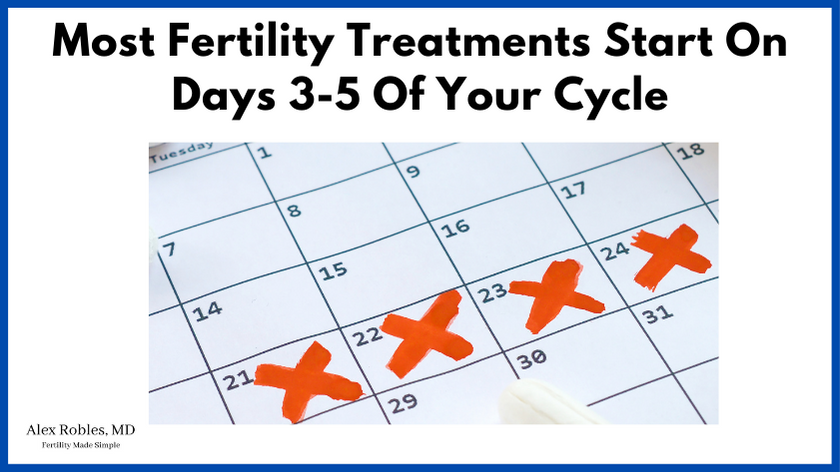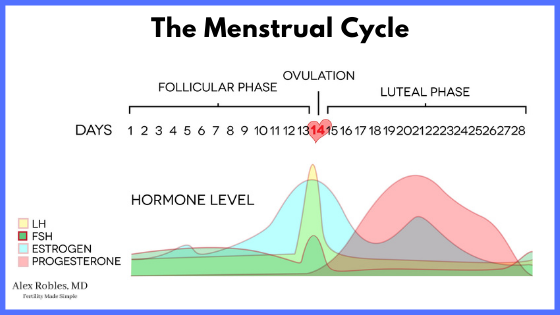Do you want to know how to take letrozole to improve fertility?
In this post, you’ll learn:
- What Letrozole is,
- When and how to take it to increase your chances of a successful pregnancy, and
- Side effects you should be aware of.
Let’s get started.

Does letrozole help you get pregnant?
Letrozole is an aromatase inhibitor, a medication used to block your body from producing estrogen. As a result, your body responds by producing ovarian follicles to raise estrogen back to a normal level.
This can be helpful for patients who are trying to conceive as it can reliably help you achieve ovulation and determine when it is going to happen.
How do you take letrozole for infertility?
The first thing you need to know is that Letrozole is not FDA approved for fertility purposes in the United States. Using it for fertility is an “off-label” use.
It is an oral medication that is taken once a day for five consecutive days in the early follicular phase of your menstrual cycle.
When should you take letrozole in your menstrual cycle for best results?
Letrozole should be taken anywhere from Day 2 to Day 5 of your menstrual cycle. (Day 1 is the first day of full flow).
If you do not get regular periods, then you may have to do a “random start.”
In this case, your healthcare provider will have to do an ultrasound and blood tests to determine when is the best time to take the medication.
Otherwise, they may prescribe a short course of progesterone to induce a period before starting the medication.

Should I have any testing done before starting this medication?
It is always a good idea to have a full workup before starting an oral fertility medication.
For example, a reproductive endocrinologist will make sure that your fallopian tubes are patent (not blocked) before starting any infertility treatment.
If your tubes are blocked, Letrozole will never work.
What Letrozole dose is typically used for fertility?
Most providers will start you with 2.5mg (one tablet) or 5 mg (two tablets) daily. This is taken for five days, as mentioned above.
The highest dose possible is 7.5mg (three tablets), and this is reserved for patients who do not respond to the lower doses.
How do you know if letrozole is working?
The best way to tell if Letrozole is working is by monitoring your ovaries with transvaginal ultrasound and measuring your estrogen levels.
This allows your provider to see how many and how large your follicles are growing in response to the medication.
Your doctor can then accurately determine when you are going to ovulate.
If you cannot come in for monitoring, you should begin checking Ovulation Predictor Kits (OPKs) 2 days after your last dose of Letrozole.
How long does it take to ovulate after taking letrozole?
In general, you should ovulate 4 to 8 days after the last dose of Letrozole.
If you are not growing a follicle or getting a positive OPK by 8 days after the last dose, it’s likely that the medication did not work.
Oftentimes, higher doses will be needed.

When should you take a pregnancy test after letrozole?
You should take a pregnancy test ~2 weeks after timed intercourse or intrauterine insemination (IUI). This is around the time that you would be expecting your period.
How can I get pregnant fast with letrozole?
There is no way to guarantee that you will get pregnant “fast” using Letrozole.
It can take several treatment cycles before you can see success.
How many rounds of letrozole does it take to get pregnant?
Depending on your age and ovarian reserve, success rates range from 4-20% per cycle.
Some women are able to get pregnant after just 1 round, but in general, most patients will try 3-6 total cycles.
If you are not pregnant after that time, you should speak with a fertility specialist to see if you are a candidate for in vitro fertilization.
What are the side effects of letrozole for fertility?
The most common side effects of Letrozole include:
- Hot flashes,
- Mood swings,
- Fatigue,
- Dizziness,
- Nausea.
Thankfully these adverse effects tend to go away in a few days as your body begins to ramp up estrogen production quickly.
Rarely, some patients can develop an allergic reaction to the medication.
How long can you take Letrozole for fertility treatment?
Most physicians will feel comfortable using Letrozole for up to 6 cycles or more. However, if you are not pregnant after 6 cycles, it might be time to discuss different treatment options.
Other Related Questions
How many follicles do you usually grow with letrozole?
In general, the aim is for one follicle to grow, which is known as monofollicular development.
Letrozole is associated with a higher probability of monofollicular development compared to clomiphene citrate, another ovulation-induction therapy.
As a result, you have a lower risk of multiple pregnancies.

Can letrozole cause twins?
If you grow more than one follicle, you will be at a higher risk for multiple pregnancy.
It is also possible to get pregnant with twins with just one follicle- as the early embryo can split, creating an identical twin.
This is known as monozygotic twinning.
Is it better to take letrozole in the morning or at night?
It is better to take Letrozole at night to avoid any effects during the day.
However, you can do the AM as well if this works better for your schedule. The most important thing is that you take the medication at the same time each day.
Can letrozole make you bleed?
If you started taking Letrozole during a “random start” cycle, (and not on cycle days 2-5), it is possible that you will experience some spotting or light bleeding.
Bleeding may decrease your endometrial thickness, which is important for implantation.
However, this isn’t an issue if your uterine lining begins to thicken back up before you ovulate.
Are there any foods to avoid while taking letrozole for ovulation induction?
It is safe to eat most foods while using Letrozole.
However, some patients find it beneficial to cut back on caffeine and alcohol consumption while taking the medication.
Which medication is better? Clomiphene Citrate or Letrozole?
Both medications have equivalent pregnancy rates in the general population.
However, women with polycystic ovarian syndrome (PCOS) have significantly higher live birth rates and pregnancy rates when taking Letrozole, according to this randomized controlled trial from the New England Journal of Medicine, and this meta-analysis.
Also, Letrozole may be associated with fewer side effects as it has a shorter half-life compared to clomiphene treatment.
How does letrozole work?
Letrozole is an aromatase inhibitor, a medication that reduces the production of estrogen.
It works by blocking the aromatase enzyme that turns testosterone into estrogen.
This causes a decrease in circulating estrogen levels. Your body responds by secreting more follicle stimulating hormone (FSH) from the pituitary gland to grow ovarian follicles.
As the follicles grow, estrogen levels increase.
These oral fertility medications are best for patients who have ovulatory disorders (aka you don’t ovulate regularly).
Another important thing to note is that Letrozole is used for patients with a specific type of breast cancer, who benefit from keeping estrogen levels low in their bodies.
Conclusion
Letrozole can be an effective fertility treatment, especially for patients with unexplained infertility, or ovulatory disorders.
Most patients can take it for ~6 cycles but you should discuss the need for further treatments if you are not pregnant after that time.
If in doubt, the use of Letrozole should always be done under the supervision of fertility specialists.
Related Articles:
- When Should You See A Fertility Doctor (Urgent Indications)
- Controlled Ovarian Hyperstimulation: Side Effects Of Injectable Fertility Medications
Make An Appointment With Dr. Robles To Discuss Your Fertility Options Today!

Alex Robles, MD
Dr. Alex Robles is a Spanish-speaking Latino-American Reproductive Endocrinologist and Infertility specialist in New York City, and a board-certified OBGYN. He has a special interest in health, lifestyle, & nutrition. Make an appointment with Dr. Robles to discuss your fertility options today!
References:
- Evans MB, Stentz NC, Richter KS, Schexnayder B, Connell M, Healy MW, Devine K, Widra E, Stillman R, DeCherney AH, Hill MJ. Mature Follicle Count and Multiple Gestation Risk Based on Patient Age in Intrauterine Insemination Cycles With Ovarian Stimulation. Obstet Gynecol. 2020 May;135(5):1005-1014. doi: 10.1097/AOG.0000000000003795. PMID: 32282611; PMCID: PMC7183886.
- Legro RS, Brzyski RG, Diamond MP, Coutifaris C, Schlaff WD, Casson P, Christman GM, Huang H, Yan Q, Alvero R, Haisenleder DJ, Barnhart KT, Bates GW, Usadi R, Lucidi S, Baker V, Trussell JC, Krawetz SA, Snyder P, Ohl D, Santoro N, Eisenberg E, Zhang H; NICHD Reproductive Medicine Network. Letrozole versus clomiphene for infertility in the polycystic ovary syndrome. N Engl J Med. 2014 Jul 10;371(2):119-29. doi: 10.1056/NEJMoa1313517. Erratum in: N Engl J Med. 2014 Oct 9;317(15):1465. PMID: 25006718; PMCID: PMC4175743.
- Roque M, Tostes AC, Valle M, Sampaio M, Geber S. Letrozole versus clomiphene citrate in polycystic ovary syndrome: systematic review and meta-analysis. Gynecol Endocrinol. 2015;31(12):917-21. doi: 10.3109/09513590.2015.1096337. Epub 2015 Oct 19. PMID: 26479460.
